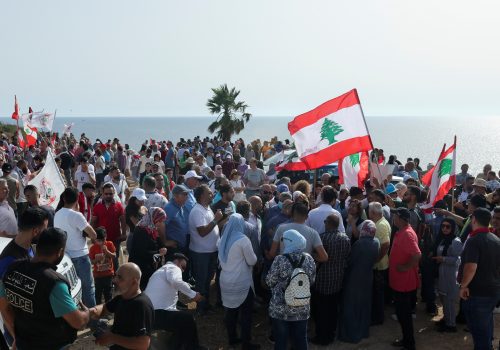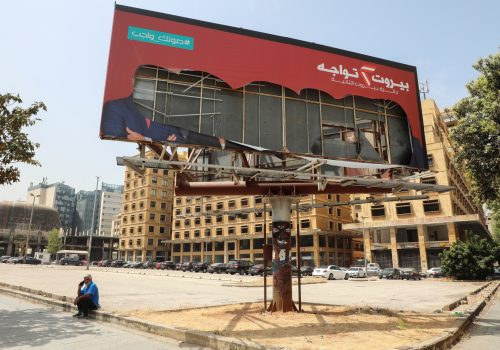Was Hezbollah behind the Megiddo bombing in Israel? If yes, it’s a new escalation.
Israel recently revealed that the suspected perpetrator of a roadside bomb attack on March 13 in northern Israel could have been a militant from the Iran-backed Hezbollah organization who crossed from Lebanon. This sparked a brief bout of tension along a border that has generally been calm for several years.
As of March 21, Israel had not formally announced whether its investigation had confirmed the origins of the bomber. But if it was a Hezbollah-planned operation, it would represent a highly unusual approach by the organization, which has tended to avoid direct action against Israel for the past decade and a half.
The suspect, whose name and nationality remain unknown, was shot dead when Israeli security forces intercepted him in a vehicle traveling close to the border with Lebanon. The suspect was reportedly wearing a suicide belt. Additional explosives and a weapon were found in the vehicle.
Israeli security forces were apparently alerted to the possibility of Hezbollah involvement by the type of improvised explosive device detonated on the morning of March 13 at the Megiddo junction in northern Israel, almost 60 kilometers south of the Lebanese border. The powerful blast seriously injured a twenty-one-year-old Israeli Arab.
According to Israeli media reports, the bomb was unlike those usually employed by Palestinians operating in the West Bank and Gaza Strip. Details of the bomb have not been revealed, although photographs of the targeted car clearly indicate that the vehicle was riddled with ball bearings. Hezbollah has long employed directional “Claymore-style” anti-personnel explosive devices that blast a target laterally with steel balls.
Hezbollah has not commented on the incident. However, sources close to the party in Lebanon said that the militant group was on alert on the afternoon of March 15 and evacuated some of its offices in southern Beirut as speculation mounted on social media that Israel was about to accuse Hezbollah of perpetrating the Megiddo bombing.
If Hezbollah was behind the attack, it would be a rare and unusual step for the organization. Since the month-long war with Israel in 2006, Hezbollah has acted with extreme caution in terms of kinetic action against Israel to prevent triggering an escalation that could lead to a highly destructive war. It has launched less than ten attacks against Israeli troops from Lebanese territory and the adjacent Golan Heights since 2006—all of them retaliation for actions initiated by Israel.
Israel, on the other hand, has spent the past decade striking Hezbollah and Iran-linked targets across Syria as part of its war-between-the-wars campaign, receiving almost no pushback. Nevertheless, Hezbollah has not been relaxing. In the past seventeen years, the organization has grown tremendously in terms of fighting strength and weaponry. Despite an agreement between Lebanon and Israel in October 2022 over the delineation of their mutual maritime border—the culmination of a decade of US-mediated negotiations—Hezbollah’s hostility toward Israel remains unrelenting.
Hezbollah has been closely watching developments in Israel and the Occupied Territories. It has taken note of the mass protests over the government’s intention to reform the judiciary, as well as the recent rise in attacks by Palestinian militants amid speculation of a third intifada breaking out. In a recent speech, Hezbollah’s secretary-general, Hassan Nasrallah, described the situation in Israel and the speculation of a looming civil war as “unprecedented.”
“This stupid and foolish government is not only pushing matters towards escalation inside Palestine, but it may also, with its foolishness, push things towards escalation in the entire region. This is a strong and likely possibility,” he said.
If Hezbollah was behind the Megiddo attack, it has echoes of a similar operation more than two decades ago. In March 2002, at the height of the second intifada, Hezbollah trained two Palestinian members of Islamic Jihad and helped them slip across the border. The two fighters, wearing Israeli military uniforms and armed with rifles, staged a roadside ambush near Metzuva, three kilometers south of the Lebanese border, killing six Israelis—five of them civilians—before being shot dead.
Israeli troops later found an elaborately designed crane-like ladder near the border fence that had been used to winch the two gunmen into Israeli territory. Hezbollah did not admit responsibility, but Nasrallah coyly noted at the time that “Whatever the Israelis are accusing us of, be it realistic or not, is a great honor for us.” Nevertheless, the ambush occurred within full view of a Hezbollah observation post on the border, and a cameraman from the party’s Al Manar television was on hand to film the action.
If Hezbollah was behind the Megiddo bombing, it likely came within the context of supporting the growing popular unrest in the West Bank. The Megiddo junction may have been chosen because of its high traffic level and proximity to the West Bank. The junction lies fourteen kilometers northwest of the flashpoint town of Jenin, By the same token, its distance from Lebanon could strengthen Hezbollah’s plausible deniability.
Still, there are some puzzling questions about the operation. Why would Hezbollah employ one of its signature roadside bombs for the attack unless it wanted to send an implicit message of responsibility? It was the design of the bomb that tipped off Israeli security forces that Hezbollah could have been involved. Why was the bomb detonated against a civilian target? Was it a case of bungled targeting? Did the perpetrator have a specific target in mind or consider that any Israeli vehicle was fair game? And why was the perpetrator heading back to the Lebanese border while still carrying a weapon and explosives?
How Israel reacts remains to be seen. Israeli Defense Minister Yoav Gallant toured the border with Lebanon on March 16 and warned that “whoever decided to test Israel” by carrying out the bomb attack “will pay dearly.” However, with each passing day, the likelihood of some form of retaliation grows remoter. If Israel does decide to retaliate, the safer option is to pursue a Hezbollah-related target in Syria, which would likely be met with little or no reaction. Israel could choose to carry out a measured escalation by targeting Hezbollah facilities in Lebanon. But the rules of the game currently dictate that, if Israel attacks targets in Lebanon, Hezbollah will retaliate, setting both sides on the risky path of brinkmanship and escalation once more.
Nicholas Blanford is a nonresident senior fellow with the Atlantic Council’s Middle East Programs.
Further reading
Thu, Jun 16, 2022
Lebanon-Israel maritime border dispute picks up again
MENASource By Nicholas Blanford
The arrival of the UK-based Energean, which will begin a drilling operation close to a disputed maritime zone in the eastern Mediterranean, has sparked tensions once more between Israel and Lebanon.
Fri, Apr 29, 2022
Lebanon has a parliamentary election next month. The Lebanese are eyeing it with apathy and cynicism.
MENASource By Nicholas Blanford
Most Lebanese believe that those politicians who created the financial disaster in the first place lack the will and ability to implement sector-wide reforms.
Fri, Nov 5, 2021
Lebanon is facing two crises. Will the new prime minister survive?
MENASource By Nicholas Blanford
For a government formed less than two months ago after more than a year of bitter political wrangling, it is becoming increasingly doubtful if it will survive long enough to reach the date of parliamentary elections four months away.
Image: A view from the Tel Megiddo Archaeological site shows the Megiddo Prison Complex in the far background, in northern Israel July 24, 2018. Picture taken July 24, 2018. REUTERS/Amir Cohen


